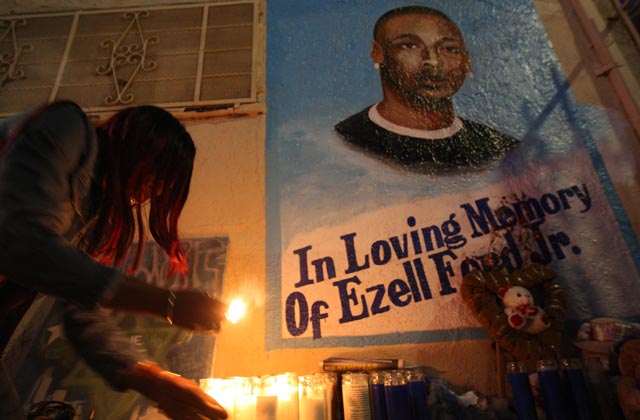A growing group of people, organized by Black Lives Matter, has been camped out in front of the Los Angeles Police Department’s headquarters since December 29 protesting the extrajudicial killings of Ezell Ford and Omar Abrego in August. The ongoing encampment ranges from about five to 30 people at any given time.
Organizers, who are using the hashtag #OccupyLAPD, says they won’t leave until their two demands are met: they want officers Sharlton Wampler and Antonio Villegas–who shot and killed Ezell Ford, an unarmed black man on August 11–to be terminated; they’re also demanding District Attorney Jackie Lacey file murder charges against Wampler and Villegas, based on an autopsy released in late December. Chief Charlie Beck has agreed to meet with the group today, nearly two weeks after the encampment began.
The autopsy for Omar Abrego hasn’t yet been released, but graphic video of his killing shows a group of officers holding an unarmed, bloodied, screaming and handcuffed Abrego down on August 2. Abrego was declared dead on August 3.
We caught up with Povi-Tamu Bryant, who works with Black Lives Matter in Los Angeles, today to ask about the encampment.
Why did you decide to camp out in front of the LAPD headquarters?
Ezell Ford’s autopsy was released December 29 and it clearly indicates that he was murdered. After its release, we wanted to put pressure on the city to begin the process of justice for Ezell Ford and to value his life by terminating the officers who were responsible for killing him, Sharlton Wampler and Antonio Villegas, as well as pressing murder charges against them. We’ve been camped out in front of the LAPD headquarters pressing for those demands and we’ll be staying until our demands are met.
You’ll be meeting with LAPD Chief Charlie Beck soon–but how has the LAPD responded so far?
We’ve had a range of what I’d call intimidation tactics used against us. In the early morning hours, we’ve had a really big group of about 30 police officers breaking down our encampment and surrounding us. We’ve also done a lot of sidewalk art trying to hold up our resilience and healing as we’re in this process together. But for the past four or five days, officers have power washed it off the street, which I think is an excessive and unnecessary use of resources during California’s drought.
We wanted to deliver a letter to Chief Beck requesting a meeting with him on Tuesday, but two of our members were denied access to the headquarters even though other folks were being allowed access. We were told that headquarters was closed to anyone without official police business–and so they were denied access and arrested.
But you’ve also had a lot of supporters, too.
We’ve had really amazing support from people. We started with a smaller encampment and have been able to expand it because of huge community support. Folks have been supporting by providing meals throughout the day–we’ve been able to provide breakfast, lunch and dinner for everyone nearly every day. We’ve also had folks donate tents, sleeping bags, blankets and hand warmers that came in really handy when it was cold last week. We’ve had passerby cars honking in support. We’ve had brilliant artists come out and show up for us.
We’ve had movement folks from L.A. too. On New Year’s Eve, Occupy Venice came out and flashed up #BlackLivesMatter on LAPD headquarters. We had our own little bat signal and that was really fun!
Do you know whether the District Attorney’s office is considering your demand to bring charges against Wampler and Villegas?
We’ve been told that the two officers are on desk duty and not out on patrol. We’ve been in communication with the District Attorney Lacey’s office, but she’s currently out on leave. Her office has expressed some interest in following up with us, so we’re prepping for a meeting with her to sit down with her so she can hear from the community directly about the importance of pressing charges against these two officers
You work with Black Lives Matter and have been evoking Omar Abrego–who was a non-black Latino. Why is that?
It’s significant to acknowledge the different ways in which folks are experiencing police brutality, and to also understand that black folks and brown folks have some similar and some different experiences with police. In Los Angeles in particular, Omar Abrego and Ezell Ford lived in the same community, were being police by the same officers and were killed within days of each other.
For Black Lives Matter, it’s important to acknowledge the disparities and differences that black folks experience police violence–while also acknowledging that black identity isn’t limited. When we say that black lives matter, we’re talking about all black lives and that includes Afro-Latino folks, black immigrant folks, black queer folks, black trans folks. We’re trying to lift all that up right now.
